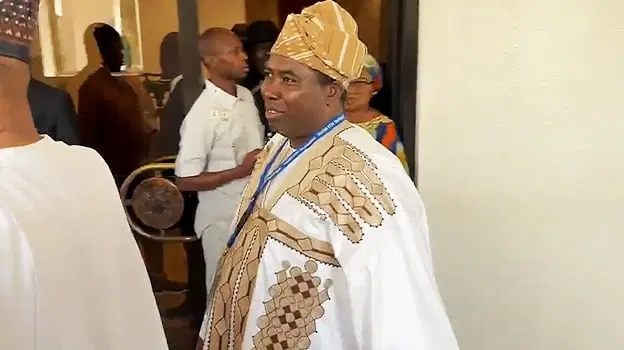INEC’s New Dawn: The Task Before Professor Joash Ojo Amupitan
BY TIMOTHY ENIETAN-MATTHEWS

When President Bola Ahmed Tinubu swore in Professor Joash Ojo Amupitan, SAN, as the new Chairman of the Independent National Electoral Commission (INEC), he did more than fill a vacant position — he handed a battered institution a fresh chance at redemption.
For many Nigerians, Amupitan’s appointment marks the beginning of what could become the most defining era in the history of Nigeria’s electoral administration.
A Professor of law and a Senior Advocate of Nigeria, Amupitan’s résumé reads like a promise — deeply steeped in constitutionalism, rule of law, and civic ethics. Yet, beyond his stellar qualifications lies a mountain of expectations. The Nigerian electorate, weary from cycles of disputed elections and deepening voter apathy, is watching keenly.
The Shadow of 2023
The 2023 general elections remain a painful memory in the national consciousness. What was heralded as a watershed moment in Nigeria’s democratic evolution — with the introduction of the Bimodal Voter Accreditation System (BVAS) and the INEC Result Viewing Portal (IReV) — quickly became mired in controversy.
Technical glitches, delayed result uploads, allegations of compromise, and perceived opacity in collation undermined public trust in INEC’s credibility. Post-election litigation became the norm rather than the exception, as both winners and losers questioned the transparency of the process.
It is within this atmosphere of distrust that Professor Amupitan assumes office. He is inheriting an electoral body at a crossroads — one struggling to reclaim legitimacy, rebuild public confidence, and modernize within a politically charged environment.
A Scholar’s Promise
During his screening before the Senate, Amupitan did not mince words about his vision. He pledged to restore confidence in Nigeria’s electoral process through transparency, accountability, and technology-driven reforms.
He spoke passionately about strengthening INEC’s internal governance, retooling its operational efficiency, and ensuring that every election — from local government polls to the presidential ballot — reflects the true will of the people.
“I will ensure that INEC regains the trust of Nigerians through professionalism, impartiality, and the strict enforcement of the law,” he said. “The integrity of an election begins long before polling day — it begins with the integrity of those who conduct it.”
Those words now form the benchmark by which his tenure will be judged.
Tinubu’s Charge: Credibility Above All
At his swearing-in ceremony, President Tinubu delivered a pointed message: “You must strengthen democracy through credible elections that reflect the will of the people. The survival of this democracy rests largely on your integrity and the fairness of the process you lead.”
It was both a directive and a warning — a reminder that INEC’s failures or successes directly affect the legitimacy of government itself. Tinubu’s call for “competence, courage, and character” echoes the public mood. Nigerians are no longer content with procedural elections; they demand credible ones.
Breaking from the Past
To succeed where his predecessors struggled, Professor Amupitan must confront systemic and structural issues head-on.
Here are key priorities before him:
1. Restoring Trust Through Transparency
INEC’s biggest deficit today is not technology but trust. Amupitan must ensure that the commission communicates clearly and consistently with the public. Election data, funding, and procurement processes should be made transparent. Real-time communication during elections can dispel rumours and restore credibility.
2. Deepening Technology – But with Accountability
BVAS and IReV are noble innovations, but technology alone does not guarantee integrity. Amupitan must ensure robust cybersecurity systems, staff training, and nationwide digital literacy to minimize manipulation and technical failures. Independent third-party audits of election technology before and after polls can further reassure stakeholders.
3. Professionalizing INEC’s Workforce
The integrity of elections depends on people, not machines. Continuous training, merit-based recruitment, and performance-based incentives for INEC staff can improve professionalism. Polling officials must be insulated from political and financial pressures.
4. Re-engaging the Voters
Nigeria’s voter turnout has been on a downward spiral — from 69% in 2003 to just 26% in 2023. This signals a dangerous erosion of faith in democracy. Civic education campaigns, youth-targeted voter engagement, and collaboration with civil society and media are critical to reversing the trend.
5. Strengthening Inter-Agency Collaboration
Amupitan must deepen coordination between INEC, security agencies, and anti-corruption bodies to curb electoral violence, vote-buying, and logistical sabotage. Establishing a clear chain of accountability before every major election will help prevent the chaos of 2023.
6. Legal and Institutional Reforms
As a Senior Advocate, Amupitan understands the need for stronger legal frameworks. He should champion reforms that clearly define INEC’s powers, set stricter penalties for electoral offences, and guarantee full financial autonomy for the commission. A dedicated Electoral Offences Tribunal, long advocated by observers, would further deter malpractices.
A Defining Opportunity
Every INEC chairman arrives amid high expectations, but few have faced a more defining moment than Professor Amupitan. The future of Nigeria’s democracy depends not just on ballots but on belief — the belief that every vote counts, and that justice flows from the people’s will.
For Amupitan, success will mean delivering elections that both winners and losers can respect. Failure would mean deepening cynicism in an already fragile democracy.
But there is hope. His reputation as a disciplined scholar, legal mind, and man of integrity has earned him goodwill across political divides. If he combines intellect with courage and independence, he could well be remembered as the reformer who redefined Nigeria’s elections — not by promises, but by performance.
The Road Ahead
Nigeria’s electoral future is again at a turning point. The lessons of 2023 are still fresh, the scars still visible. Professor Joash Amupitan must lead INEC not merely as an institution of logistics but as a symbol of national conscience.
To rebuild credibility, he must first restore faith. And to restore faith, he must let fairness — not fear or favour — guide every decision.
If he succeeds, Nigerians may once again believe that democracy, though imperfect, is still the best path forward.












